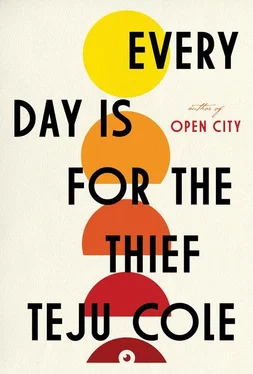
My aunt thinks it is a bad idea. Her brother, my Uncle Bello, agrees. Her husband is indifferent, but he acts as if it is a bad idea. Everyone says I must not travel by danfo. The danfo is a death trap. It is a haven for practitioners of black magic, and is full of thieves. This much is known.
— But I used to ride the danfo frequently in my high school days, I even used to ride the molue, which is bigger and more dangerous.
— Ehn, that was a long time ago. You’re not quite as hardened now. Yes, you are street-smart, no one doubts it. But like it or not, America has softened you.
Uncle Tunde, Aunty Folake’s husband, is amused by the idea that I want to go out and take public transportation. He does it from time to time, sure, but he is not visiting from America. To him and his wife, this is more evidence of my eccentricity. Why not just wait till the next day, so that the driver can take me? My destination is so far and the journey so complicated that any number of things could go wrong. They don’t understand that being there on the danfo, being there on the streets, is the whole point of the exercise. And there is no instinct there for helping them understand it, and all they have to hold on to is how contrary I was even as a child, in those years before my father died.
Just as I am about to leave, a guest arrives. He is a young man, the husband of Uncle Tunde’s cousin. My aunt asks him if he has a car. He does. In the blink of an eye, she persuades him to drive me all the way to Lagos Island. I know what this is about. It is about keeping the lines of privilege taut. Everyone does it. Each person knows how to get maximum comfort out of situations, how to avoid being “one of the masses.” It is essential, not just in terms of safety, but also in social terms. Aunty Folake has not been on a public bus in more than twenty-five years and, as she put it to me: “I’d rather not travel at all, than ever ride in one of those things!” I almost give in, but then it all strikes me as wrong-headed, and I say:
— Wait. This guy has plans of his own. Look, I’ll be fine. Why take someone else so far out their way? A guest calls and, next thing, we make him a chauffeur?
My protest settles it. I walk out of the housing estate and within a few minutes find myself in the thick of that assault to the senses that is the Ojodu — Berger Bus Terminus. It is just shy of 9:30 in the morning and the place is teeming. The degree to which my family members wish me to be separate from the life of the city is matched only by my desire to know that life. The danfo, carrier of the masses, is the perfect symbol of our contest. The energies of Lagos life — creative, malevolent, ambiguous — converge at the bus stops. There is no better place to make an inquiry into what it was I longed for all those times I longed for home.
The typical Lagos danfo is yellow and decrepit, and seats fourteen: two in front with the driver, and three rows of four passengers each. The bus is operated by a team of two: the driver and a conductor, who is also known as the tout. In the typical bus terminus, such as those at Ojota, Yaba, Ikeja, or Ojodu, the air is thick with the cries of touts. They have to fill those fourteen seats as quickly as possible, and get a move on to their destination. “Jotajota-jotajota.” That’s the man calling Ojota. “Kejakejakeja. Kejakeja-straight.” That’s the express to Ikeja bus stop. The sound that rises from the thrum of congested traffic is like a chorus of cantors or auctioneers. “Balende — CMS, Balende — CMS, Balende-balende-balende.”
Touting is not a job. It is a way of being in the world, a distillate of pure attitude: the chest puffed out, the body limber, the jaw set to brook no opposition. There is in every tout the same no-nonsense attitude, the quick temper, the willingness to get into a fight over any and all conflicts. There is a strut they do, a swagger. These are the original wiseguys of Lagos; some of them are as young as fourteen. They do not go home in the evening and stop being touts. The thing is bound to their souls. The regular non-tout Lagosian, too, has to share this attitude. The body language as one moves through the street has to be one of undiluted self-assurance. Uncertainty in the face or gait attracts attention, and attention is bad. When you catch a stranger’s eye, the message you send has to be unequivocal: “Trust me, you don’t want to mess with me.” There are many people on these streets who roam around looking for victims. People who, through long practice, can sniff out weakness wherever it is.
My Uncle Bello, a well-built man in his forties, told me about going to Oshodi market and being accosted. A rough-looking man approached him on the Oshodi overpass and asked for money. My uncle thought about it and gave him two hundred naira. The man was unimpressed.
— Ah, no o. My money is one thousand.
Uncle Bello said he had to assess at that point whether to call the guy’s bluff or to cave in to the extortion. He called his bluff. It was a bad move. The guy got extremely hostile.
— Heh? What do you mean by no? I will waste you. I will waste you. You see this bridge? I’ll dangle you from the edge, I’ll throw you off it!
My uncle’s options were suddenly limited. He knew that if he gave the thug the thousand naira, his whole wallet could get cleaned out. The man could tell him to take off his trousers and crawl on all fours in the dirt or something similarly humiliating. On the other hand, he really did look like the kind of guy who could make good on his threat of murder.
Uncle Bello’s instincts told him to fight fire with fire. He had lived in Europe for a long time, studying management in Krakow in the 1980s. In fact he was still fluent in Polish. But he had also grown up in a relatively poor family, and had had to fend for himself from an early age. So he knew the ways of the street. He started shouting at the man:
— Waste me? Waste me? Are your eyes functioning? Look at me very well before you say another word. You don’t recognize me? I will injure you, I will kill you. You understand? I will kill you! Do you know who you are talking to? Ehn? Do you know me? I will make your wife a widow!
“But, of course,” my uncle added with a deep laugh, “the whole time I was saying this, I was quaking in my shoes like you wouldn’t believe.” The guy bought the act though, and started begging my uncle to forgive him. Finally, my uncle gave him another two hundred, and they parted ways. About three dollars had changed hands. Both lived to tell the tale. Lagos.
As I make my way through the crowd at Ojodu — Berger, a cellphone and a small digital camera are in the front pockets of my jeans. My shoulders are dropped back, my face is tensed, my eyes narrowed. It is difficult to keep from overdoing it at first, hard to recall how I had managed all those years ago, but I soon find the right register. The trick is to present an outward attitude of alertness, while keeping a calm and observant mood within. And there also has to be the will to be violent, a will that has to be available when it is called for. I am determined not to crawl on all fours or bark like a dog. I am especially conscious that my light complexion could make me a target out here.
I easily locate one of the buses plying the Obalende — CMS route. It is neither more nor less rickety than any of the others. They are all in bad shape, but they are all functional. I climb in, squeezed between two men in the back row. One of the men wears a sky-blue baseball cap and has a swollen eye. The other man is older. He reads a newspaper. The bus fills quickly and we all begin to sweat. Someone pushes a window open and a cooling breeze curls around the bus. That is when I see her.
Читать дальше













